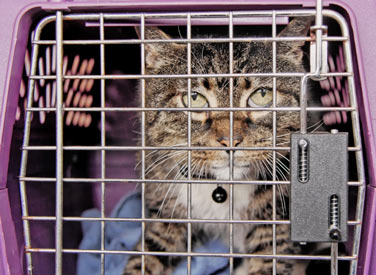Car Sickness in Cats

Many cat owners have experienced the unhappy phenomenon of driving with your cat in the car when suddenly you hear the unmistakable sounds associated with feline vomiting. You know that you'll now need to clean the carrier and your cat when you get to your destination. Why do so many cats experience car sickness?
What Causes Car Sickness in Cats?
Cats may vomit in the car because of motion sickness. Their inner ear balance systems aren't used to the different pressures and sensations involved with car-riding. This is especially an issue in kittens because their balance system is still immature. Other causes of car sickness in cats may include:
- Car sickness in cats is often caused by anxiety, which can be the result of one or more of the following conditions:
- Infrequency of riding in cars.
- Being an indoor cat not used to leaving the home.
- Experiencing car rides only in connection with a stressful event, such as a visit to the veterinarian, groomer, or kennel.
Signs of Car Sickness in Cats
If your cat suffers from car sickness, you may see or hear the following signs from her while she is in the car:
- Drooling.
- Crying.
- Acting frozen in place.
- Vomiting.
- Urinating and/or defecating.
Treatment of Car Sickness in Cats
The treatment of feline car sickness may include medications, natural remedies, and/or desensitization.
-
Medications: There are several classes of medication that are used with varying degrees of success for feline car sickness.
Never give your cat any medication without speaking with your veterinarian first. Cats are sensitive to a large number of substances, and many human products can cause illness and death.-
Tranquilizers
- Acepromazine is the most common tranquilizer used for car sickness in cats. Not only does it produce sedation, but it is also a powerful anti-nausea medication. Its effects vary greatly between individual cats, so there is often some trial-and-error involved in finding a dose that produces the desired result.
- Phenobarbitol is an anti-seizure medication with tranquilizing effects that has been used for car sickness in cats.
- Diazepam (Valium) is an anti-anxiety medication that can be useful for car sickness in cats when used with caution. There have been instances of cats developing liver problems from valium, and it isn't possible to tell which cats will experience this.
-
Antihistamines: may produce sleepiness as a side effect, and this may help your cat relax during car rides. They also often have anti-nausea effects. The results when used for car sickness in cats are variable among individuals.
- Meclizine (Bonine or Antivert) is an antihistamine that works as an anti-nausea medication when the cause of a cat's car sickness is motion-related.
-
Antiemetics are anti-vomiting medications that may help keep your cat from becoming sick during car rides, whether the cause is anxiety or motion.
- Dimenhydrinate (Dramamine) is sometimes used in cats with motion sickness.
- Maropitant (Cerenia) is a prescription medication labeled for some types of vomiting in cats and car sickness in dogs. It has been used successfully for car sickness in some cats, as well.
- Chlorpromazine is an anti-nausea medication that can be useful in treating car sickness in cats.
-
-
Natural remedies: Natural products can help soothe anxiety in some cats.
- Feliway is a compound that mimics the feline facial pheromone, which is calming to cats. You can spray the inside of the cat carrier ten minutes before you put your cat in it.
- Ginger extract has been used in some cats suffering from car sickness with good results. Ask your veterinarian before giving a ginger supplement to your cat.
- Rescue Remedy is an herbal formulation that helps calm many cats. You can give some on a treat or in your cat's water before leaving on a car ride.
-
Desensitization: The large majority of cases of feline car sickness are due to anxiety. You can help your cat with this anxiety by trying to slowly desensitize her to the cat carrier, the car, riding, and going places. You can try the following steps to help get your cat used to car rides:
- If possible, start acclimating your cat to car rides when she is a kitten because she will adjust to new experiences more easily then than when she is older.
- If medication strictly aimed at controlling motion sickness doesn't resolve your cat's car sickness, it may indicate that the problem is anxiety-related.
- Start by getting your cat comfortable with the cat carrier. Spraying the inside with Feliway about 10 minutes before putting her in can help. Loading your cat in the carrier rear end first can help you get her in more easily. Fighting with your cat to get her in the carrier can increase negative associations to it.
- Leave the carrier out and open all the time. You may find that your cat likes to go in there and snooze with the door open. Doing this may help her to identify her carrier as a safe, cozy place. You can feed her treats when she goes in it on her own, increasing the positive associations she has with the carrier.
- Once your cat is comfortable in the carrier, practice sitting in the car next to her while she is in it. Don't start the car. If your cat is calm, feed her treats through the carrier grate. Never leave your cat in the car alone, and don't practice this during very hot or very cold weather.
- Once your cat will sit in the carrier calmly with the car off, practice turning on the engine while she sits in her carrier in the passenger seat and you sit in in the driver's seat next to her. Never leave your cat alone in the car. Give your cat treats when she is calm.
- Once your cat is calm with the car engine running, try driving a very short distance such as around the block. Gradually increase the distance of the car rides as your cat becomes more and more comfortable with them.
- During the desensitization process, it is important not to reinforce any fearful or anxious behavior that your cat may be showing. Don't respond to crying or pawing at the carrier door with a soothing voice or treats. Your cat will associate these types of responses from you with the behavior she is displaying at the time, and it can cause escalation of the fearful behavior.
You May Also Like These Articles:
Feliway - A Useful Tool to Help Treat Stress in Cats
How To Take Your Cat To The Vet
Training Your Cat To Use A Pet Carrier
Notice: Ask-a-Vet is an affiliated service for those who wish to speak with a veterinary professional about their pet's specific condition. Initially, a bot will ask questions to determine the general nature of your concern. Then, you will be transferred to a human. There is a charge for the service if you choose to connect to a veterinarian. Ask-a-Vet is not manned by the staff or owners of CatHealth.com, and the advice given should not delay or replace a visit to your veterinarian.





